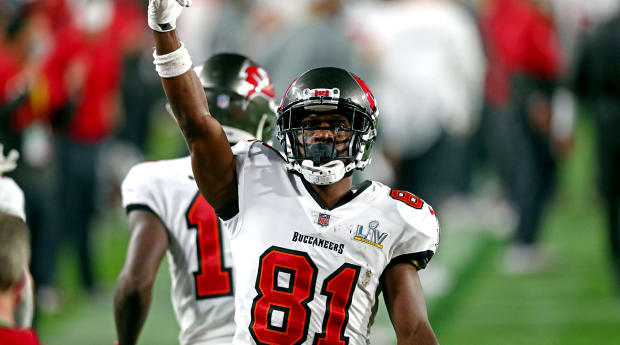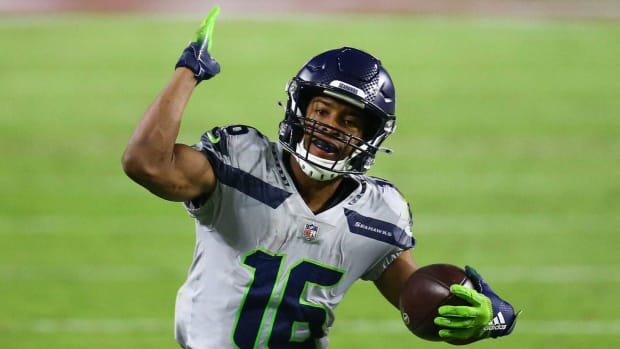SI Fantasy analyst Michael Fabiano shares his discoveries on how game script affects wide receivers across fantasy football.
Game script. Positive. Negative. Neutral. We hear these terms more and more as folks discuss the advantages and disadvantages of players under different game scenarios.
To help fantasy managers use this data to help them in their upcoming drafts, I looked at how each of the four major offensive skill positions (QBs, RBs, WRs, TEs) did, based on fantasy points when their team won or lost. To spin that to the future, I also examined projected over/under totals for wins and losses for this season.
Let’s continue this research project with wide receivers. Players were required to play at least eight games, so someone like Odell Beckham Jr. (who started just seven games) was not included. Since the Kansas City Chiefs lost just one game in the regular season, I put a minimum of five targets in either scenario (wins or losses). Ties were not considered in this exercise. Let’s find out how the information can help us for 2021!
Game Script:
Quarterbacks | Running Backs | Wide Receivers | Tight EndsNegative Win/Loss Point Differentials
Note: The total to the right of the player’s name is the decline in average fantasy points he experienced in losses compared to his average fantasy points in his wins. Deebo Samuel, for example, averaged 11.6 more points in wins than in losses last season.
1. Deebo Samuel, 49ers (-11.6, O/U 10.5)
Samuel had the biggest difference in points among wideouts, averaging 18.2 in three wins but just 6.6 points in his four losses. His average in losses ranked outside of the top 90 fantasy receivers. Samuel also averaged three more targets per game in wins. The 49ers are tied for the 12th easiest schedule based on 2020 winning percentages, which is good news for Samuel. He’s a nice target in the middle rounds as a No. 4 wideout.
2. Antonio Brown, Buccaneers (-11.1, O/U 12)

Mark J. Rebilas/USA TODAY Sports
Brown played in just eight games last season, but he did have a notable decline in his points when the Bucs lost. He averaged 18.8 points in five wins but just 7.7 points in three losses. The good news is that the Buccaneers have one of the highest over/under totals (12) in the league, and their schedule is ranked as the fourth-easiest this season. A potential value in drafts, Brown is going behind both Mike Evans and Chris Godwin.
3. Julio Jones, Titans (-11, O/U 9.5)
Jones played in just nine games last season, but he was far worse in losses. In those six games, he averaged 12.6 points. That was 11 fewer points than he averaged in his three wins (23.6 PPG), which ranked second among victorious wideouts. Now with the Titans, Jones will be the No. 2 option in the pass attack behind A.J. Brown. Tennessee is tied for the 13th-easiest schedule this season, and the over/under on wins is 9.5.
4. DeAndre Hopkins, Cardinals (-10.8, O/U 8.5)
This might be the most surprising wideout on this list, as Hopkins ranked third in terms of fantasy points averaged in wins (23.4 PPG) but fell outside of the top 30 in eight losses (12.6 PPG). Considering that Nuk's quarterback, Kyler Murray, had the biggest negative differential shows a trend with the Cardinals. Their schedule is tied for 13th-easiest, and the over/under on wins is 8.5. Hopkins remains a second-rounder.
5. A.J. Brown, Titans (-8.2, O/U 9.5)
The second current Titans receiver on this list, Brown averaged 20.6 points (seventh among victorious wideouts) but averaged 12.4 points in five losses. That ranked outside of the top 30. Brown also averaged close to two fewer targets per game when the Titans lost, which might seem odd because a negative game script would suggest more targets. Regardless, Brown should be seen as a low-end No. 1 fantasy wideout in 2021 drafts.
Notables
- DK Metcalf was decidedly better for fantasy fans in wins (18.8 PPG) than he was in losses (11.5 PPG) last season. What’s more, he averaged 2.1 more targets per game when the Seahawks were victorious. Seattle has a 9.5 over/under total heading into the season, and their schedule is tied for the 11th-most difficult in the league. Metcalf remains one of the top 10 fantasy wideouts, but this is a notable trend. His teammate, Tyler Lockett, was far better in wins (see below).
- CeeDee Lamb experienced a decline of 6.4 fantasy points in losses (11.2 PPG) as opposed to wins (17.6 PPG) during his rookie season. Of course, just three of the 10 losses saw Dak Prescott under center. In that trio of contests, Lamb put up an average of nearly 16 fantasy points. That's a more representative stat, as Lamb had Andy Dalton, Garrett Gilbert, and Ben DiNucci throwing him the ball in those other games. He's a massive breakout candidate in fantasy circles in 2021.
- Chase Claypool had a solid rookie season, scoring 11 combined touchdowns. He was, however, 4.8 points better on average when the Steelers won. What’s more, he scored 10 of those touchdowns in wins and just one in losses. That makes sense since the team won 12 games, but their over/under total for this season is 8.5. Pittsburgh also has the most difficult schedule in the league for 2021.
Positive Win/Loss Point Differentials
1. Brandon Aiyuk, 49ers (+7.2, O/U 10.5)
While Samuel had the biggest points differential when the Niners won versus points in losses, Aiyuk was the opposite last season. He averaged 18.4 points when the 49ers lost but just 11.2 points in wins. There's a simple explanation, however. In a five-game stretch, all losses, Aiyuk averaged 21.5 points. George Kittle played in just one of those games, and Samuel played in two. I consider this an anomaly for Aiyuk.
2. Corey Davis, Jets (+6.4, O/U 6)
While his former teammate, A.J. Brown, was better in wins than in losses, Davis was the opposite. In nine wins, he averaged just 11.4 points. In five losses, he put up a far better average of 17.8 points. Davis also averaged 2.2 more targets in victories. Now with the Jets, who have an over/under of six wins, he'll likely be on the losing end of games more often than when he was in Tennessee. Jets pass catchers come with questions with rookie Zach Wilson under center, but Davis is their best fantasy option.
3. Tyler Lockett, Seahawks (+6.2, O/U 9.5)

Lockett was one of the more inconsistent receivers in fantasy last season, scoring 123 of his 265.4 points in three games. One of those games, a loss to the Cardinals, saw him score 53 points. That skews this research because he scored just 32.9 points in his other three losses. That's an average of 10.9 points, around four points fewer than he averaged in wins. If you're wondering, Seattle is tied for the 11th-easiest slate.
4. Amari Cooper, Cowboys (+5.6, O/U 9.5)
Cooper's teammate, Lamb, was better in wins, but that stat was affected by the loss of Prescott. The same is true for Cooper. In three losses with Dak under center, Cooper averaged 23 fantasy points. Without him, the veteran averaged 14.3 points in losses. Interestingly, Cooper was slightly worse in Dak wins (10 PPG) than in wins with another quarterback (11.9 PPG). Might this be another reason to like Lamb more than Cooper?
5. Calvin Ridley, Falcons (+5.5, O/U 7.5)
Ridley is coming off a career season where he was better in losses (19.9 PPG) than wins (14.4 PPG). He was even better in losses without Julio Jones (20.8 PPG) but was also solid in losses when Jones was active (18.9 PPG). In one win without him, Ridley scored 17 points. The Falcons are projected to be a sub-.500 team, but they do have the third-easiest schedule in the league. Regardless, Ridley is a cinch top-24 pick.
Notables
- Cole Beasley finished as the WR27 this past season, averaging 13.8 fantasy points overall. He was better in losses, however, scoring 17.9 points in those three games. In fact, he averaged almost two more targets per game when the Bills were defeated. His teammate, Stefon Diggs, was equally as good in wins (20.5 PPG) as losses (20.8 PPG) both for the Bills and fantasy footballers alike.
- Robert Woods averaged close to five more fantasy points in six losses (18.4 PPG) than he did in his 10 wins (13.5 PPG) from last season. He also saw one more target per game in losses, which means, in part, he was targeted more in negative game scripts. His teammate, Cooper Kupp, was less productive but more consistent in terms of points in wins (14.1 PPG) versus losses (13. 6 PPG).
- Diontae Johnson was the most consistent Steelers wideout in terms of points scored in wins (14.6 PPG) compared to losses (15.4 PPG). JuJu Smith-Schuster was also better in wins, averaging 15.5 in victories against 12.1 points per game scored in losses. As I mentioned earlier, Claypool was 4.8 points better in wins.
Michael Fabiano's PPR Redraft Rankings
Training Camp Battles
Quarterbacks | Running Backs | Wide Receivers & Tight Ends
Fabiano's Top 10 Lists
Breakouts | Sleepers | Deep Sleepers | Busts | Rookies
"The Fantasy Case Against" Series
Justin Herbert | Jalen Hurts | Zach Wilson (Dynasty) | Alvin Kamara | Darrell Henderson | Derrick Henry | Michael Carter | David Montgomery | Saquon Barkley | D’Andre Swift | Brandon Aiyuk | Ja'Marr Chase | Julio Jones | Justin Jefferson | Kenny Golladay | Kyle Pitts | Travis Kelce
Michael Fabiano is an award-winning fantasy football analyst on Sports Illustrated and a member of the Fantasy Sports Writers Association (FSWA) Hall of Fame. Click here to read all his articles here on SI Fantasy. You can follow Michael on Twitter, Facebook, YouTube and Instagram for your late-breaking fantasy news and the best analysis in the business!

0 Comments